Why RPGs are best when they're built around a single city
The next open world RPG should ditch the countryside and focus on one intricate city. And it should never make you leave.
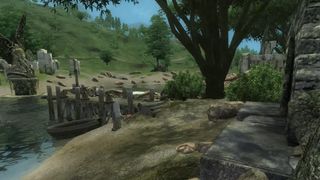
Everybody remembers the Oblivion Moment, yeah? It's been repeated in so many open-world games that even if you haven't played Oblivion you've had an Oblivion Moment, whether it was actually a Fallout 3 Moment or an Amalur Moment. It's what happens when you step out of the tutorial zone and get blinded by the dazzling light of the world you're free to explore, like a beautiful baby alien emerging from a gaping human chest cavity.
In Oblivion you've slogged through a sewer dungeon to get The Moment. You've earned it. You finally killed all the damn goblins and get to stand outdoors, on the shore of a rolling river. Across the water you see crumbling stone ruins, a bandit camp, and endless greenery leading off into the draw distance.
At which point you probably turn around. You have that urge to go left instead of right at the start of a level, whether it was instilled by Pitfall! or Metroid. That's what I did, and behind me rose the white stone of the Imperial City. Bugger the countryside—that's where I went. For hours I walked the streets, talked to beggars, met the head of the Thieves Guild in a graveyard, and interrogated a suspicious merchant named Thoronir who had a face like a shiny punchable brick. They were good times.
When you leave the city you swap a location that seems full of possibility and bigger than it really is with places that end up shrinking your conception of the game world.
Too soon, I had to leave. Questlines kept sending me to towns with unlovely names like Chorrol and Skingrad. Oblivion and games like it don't want you spending too long in one place, because you'll start looking at it too closely and realize there aren't that many people for a city of its size and start asking uncomfortable questions. There are 194 citizens in the Imperial City and 119 guards. How much crime do they think people commit?
Living in the Imperial City's great, though. The shack on the waterfront is the cheapest home in the game and also the best. Sure, it's a fixer-upper, but the fact it's small means everything you need is in a single room and you can swim to it from a nearby fast-travel point even if you're wanted by all 119 of the city's guards.
The big city is the place to be in so many RPGs. Almost all the good bits of Baldur's Gate 2 happen in the city of Athkatla, a city where almost everything is legal except unlicensed spellcasting, and that's what all the cool kids are doing. When we reminisce about Planescape: Torment it's Sigil we think of, a city built on the inside of a giant floating doughnut, not Curst, a border town we visit way too late in the game to care about.
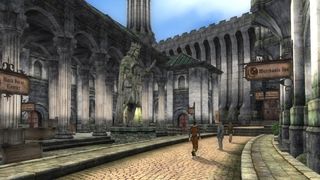
In the city there's something to find around every corner, and while in the wilderness there are impressive sights—the cliffs of Skellige, the mountaintop views of Skyrim—there's a lot of trekking to get from one to the next. In Sigil the Smoldering Corpse Bar, Ragpicker's Square, and the Brothel For Slaking Intellectual Lusts are all just a few screens apart.
The biggest gaming news, reviews and hardware deals
Keep up to date with the most important stories and the best deals, as picked by the PC Gamer team.
Thanks to the unrealistically low population numbers necessitated by processing power, videogame cities cram their interesting characters close together. In the shifting tectonic city of Anachronox, from the game of the same name, you're never far from Whackmaster Jack and his brawling lessons or K'Conrad the floating informant. But eventually you have to leave Anachronox and travel to a spaceport full of scientists, then a world where everyone is obsessed with the democratic process. Neither of which is nearly as interesting. It's like when Final Fantasy 7 makes you leave Midgar behind, or Mass Effect boots you off the Citadel—you swap a location that seems full of possibility and bigger than it really is with places that end up shrinking your conception of the game world.
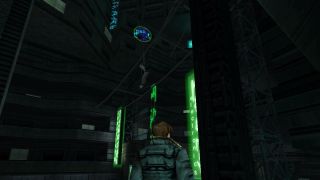
Novigrad Noire
While RPGs are fixated on their progression from the small tutorial area to the big city to the wide world beyond, open-world games that aren't really RPGs (though they borrow some of their mechanics) have no compunction about putting all their effort into a detailed city you can't leave. Most of the Grand Theft Auto and Saints Row games, Sleeping Dogs, L.A. Noire, and some of the Assassin's Creed games have concentrated on making ridiculously detailed cities for crimes to happen in. Now imagine the kind of effort put into those games poured into an RPG that traded detailed vehicle physics and shooting for dialogue choices and branching questlines.
Grand Theft Auto: San Andreas was the closest the GTA series came to being an RPG. Its protagonist CJ could be personalized with more than just a haircut and had stats that affected how good he was at driving or running, as well as how chubby or muscular he got. My CJ and your CJ might have had different amounts of stomach flab, different girlfriends, different levels of respect with the gangs, and access to different fighting styles.
But San Andreas was also the GTA that pushed you out of the city, forcing you to abandon Los Santos and its gang wars for the much less interesting San Fierro and then an airfield where you had to spend hours gaining a pilot's licence. When GTA became an RPG it followed the genre's lead by making you leave the city—and suffered for it.
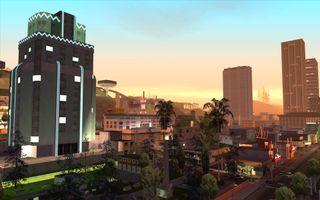
Of course, there have been attempts at RPGs set in and around a single city before. Dragon Age 2's energetic haters and fans have been furiously skimming over the previous paragraphs waiting for a mention of it. But though Dragon Age 2 limited itself to the city of Kirkwall and its surroundings, it infamously recycled so much that it felt thinner than the previous, larger Dragon Age when it should have felt more compact and detailed. Kirkwall was a city with only one warehouse in it—though it must have been a pretty good warehouse since every other covert meeting and gang war took place there.
Dragon Age 2 wasn't the first fantasy RPG to limit players to one city and cop flak for it. Way back in 1989 the D&D game Hillsfar trapped characters in a city like Athkatla where magic was banned. And apparently so were levelling up and the turn-based combat of the other D&D games.
There has been an RPG that made a single-city setting work, however. Vampire: The Masquerade – Bloodlines night-time Los Angeles is made up of hubs representing Downtown, Chinatown, Santa Monica and Hollywood, each with a different atmosphere, each a different angle on the city of angels.
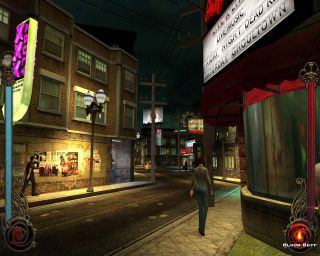
Bloodlines works as well as it does because you're a predator and the city's your feeding ground. It needs to have its dark alley with a guy pissing up against a wall, its multiple nightclubs, its believable parking lots, because those are places you can feed. The city, full of people and dark places to get away from them, is a perfect setting for vampires, which is why Bloodlines had to pull off what other RPGs haven't. It was focused, able to evoke one place in a layered and hyper-detailed way. Even an inconsequential security guard had a story. Every hangout felt meaningfully distinct—even though two of them were goth clubs.
That's what can happen when games stop chasing the goal of bigger meaning better, of trying to give us entire countries or even planets to ramble across and then having to repurpose the same story ingredients like they're stretching out last week's leftovers. In the city small distinctions can matter, even if it's the difference between the cafe you like and the one across the street you don't like. Spending time in one place makes us imbue it with significance if it does even the littlest things to earn it.
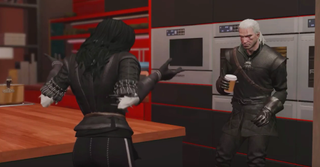
Games benefit from significance. A quest to save a place stops being item three in the journal when that place is the bar your favorite busker plays at. Finding out there's a fortune hidden in a building might make you want to steal it, but if the people who own it have a life beyond that you think twice. Characters who aren't just job titles and sleep schedules, shops that aren't just inventories and price lists, and locations that have as much personality as the people in them. How often do videogame cities even bother naming their streets?
Now imagine a fantasy RPG with a level of detail equivalent to that of Bloodlines' Los Angeles or GTA's Los Santos. Taverns to hang out in, carriages to catch from place to place, markets to visit, and so many characters to talk to there'd be no reason to leave except for that one quest in the abandoned hotel outside of town.
I've got my fingers crossed hoping there are people out there willing to overlook the reaction to Dragon Age 2 and try a one-city RPG again. I've had enough Oblivion Moments now.

Jody's first computer was a Commodore 64, so he remembers having to use a code wheel to play Pool of Radiance. A former music journalist who interviewed everyone from Giorgio Moroder to Trent Reznor, Jody also co-hosted Australia's first radio show about videogames, Zed Games. He's written for Rock Paper Shotgun, The Big Issue, GamesRadar, Zam, Glixel, Five Out of Ten Magazine, and Playboy.com, whose cheques with the bunny logo made for fun conversations at the bank. Jody's first article for PC Gamer was about the audio of Alien Isolation, published in 2015, and since then he's written about why Silent Hill belongs on PC, why Recettear: An Item Shop's Tale is the best fantasy shopkeeper tycoon game, and how weird Lost Ark can get. Jody edited PC Gamer Indie from 2017 to 2018, and he eventually lived up to his promise to play every Warhammer videogame.

Microsoft's Phil Spencer denies Avowed was delayed because it's janky: 'We didn’t move it because Obsidian needed the time. They’ll use the time'

Bioware's art lead shared some off-the-wall rejected concepts for Dragon Age: Inquisition's multiplayer characters, including the return of a controversial companion we never saw again
Most Popular




